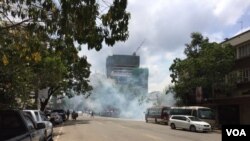Nairobi police used tear gas and water cannons to prevent demonstrators from assembling to protest the electoral commission, known as the IEBC.
Demonstrations went ahead Monday in several other Kenyan cities, and three people died under unclear circumstances in and around the western city of Kisumu.
Raila Odinga, Kenya’s former prime minister and current opposition leader, says the ruling party has "no choice" but to discuss the opposition's demand for changes to the electoral commission. Odinga visited VOA's Nairobi studio Tuesday, a day after the deaths in Kisumu.
Peaceful dissent
Odinga says there is a better way to deal with the situation.
“And if the police allow these demonstrations, they will be really very peaceful, and they will just agree with us, you start from point A to point B, at this time,” said Odinga. “And people will do those demonstrations the way they do it in London, they way they do it in New York, the way they do it in Tokyo and so on.”
Odinga's CORD coalition has been organizing the protests to demand changes in the electoral commission, which opposition parties say favors the ruling Jubilee coalition.
Odinga says CORD wants a level playing field before presidential and parliamentary elections scheduled for August of next year.
To do so, he says he and his supporters want the current nine full-time electoral commissioners to step down and be replaced with five new ones that act more like an executive board. They also want the multiple voter registers to be supplanted by a single accurate one, and for the electronic voting process to be smoothed out before election day.
Talks necessary
Odinga says the current government, and by extension, the ruling Jubilee coalition, must sit down for constructive dialogue.
“They have no choice,” said Odinga. “They will have to agree to sit down and negotiate. So we will continue for as long as it takes. We will not surrender. That is not an option.”
If the playing field is leveled, Odinga says, then the politicians, including himself, should accept the results of the elections, whatever they may be.
“Why is it so difficult here in Africa? It can be done,” said Odinga. “What we are seeing happening right now is the emergence of the strongmen on the continent. You saw what happened in Burundi, you saw what happened in Uganda, what is about to happen to DRC. It is happening around the whole region and the continent. And we’re saying that this is not right for democracy. Africans should not be judged by different standards from the rest of the world. Africa needs to be recognized as part and parcel of the international community.”
Odinga says that his coalition's protests will continue every Monday until the demands are met.





